6 Astonishing US-based Data Science Startups Working for a Better Tomorrow
Is data science reserved only for big players? You couldn’t be more wrong. Read how data science helps startups build successful and meaningful businesses.
Joanna Konieczna
Mar 8, 2022 | 15 min read
Is data science only useful for huge corporations to crank out more and more figures and profits? Not exactly…
Today, I’d like to present to you 6 startups aiming to not only make a profit but also work towards ecology, health and inclusivity using the latest technologies.
What is Data Science?
Let’s start with a brief explanation of what exactly data science (DS) is, besides it being a super popular buzzword used by companies whenever possible. The term "data science" began to appear in various contexts in the early 1970s as, among other things, a proposal to change the name of statistics, formulating itself to a definition closer to the one we know today at the end of the last century. The title of my profession, which is "data scientist," was coined around 2008, when companies realized the need for data professionals who can organize and analyze massive amounts of data.
As said by John Foreman, data scientists are kind of like the new Renaissance folks, because data science is inherently multidisciplinary. In fact, it brings together many disciplines, including statistics, the scientific method, artificial intelligence (AI), and data analysis to extract value from data. To get the most out of the aforementioned disciplines, a data scientist must also have a stock of slightly more tools in the form of programming skills, working with databases, or designing production-ready solutions.
Equally important, and often overlooked, the data scientist profession requires a good dose of soft skills, especially the ability to present complex topics in a condensed and audience-friendly manner regardless of their field of expertise. I personally see a data science person as a kind of link between the world of data and algorithms and the people who make decisions based on business insights derived from data.
PS. I'd like to toss you my two favorite quotes about data science that you can use in casual conversation or during a serious kitchen discussion at a party (yes, we data scientists go to parties sometimes too!).

Surprising Numbers and Facts from Data Science Field
Let's feel like a data scientist for a moment and delve into numbers and statistics from the world of data science. Did you know that:
-
The term "data science" is 48 years old, but its popularity is only now booming.
-
Less than 0.5% of all the data we create is ever analyzed and used.
-
By 2025, experts indicate that over 463 exabytes of data will be created each day, the equivalent of around 212,765,957 DVDs.
-
A 10% increase in data accessibility will result in more than $65 million additional net income for a typical Fortune 1000 enterprise.
-
The big data analytics market will reach a value of around $103 billion by 2027
-
If data had mass, the Earth would be a black hole.
-
Every second, 63,000 search queries are performed on Google which results in 1.2 trillion searches per year.
-
In 2022, poor data quality could cost the US economy as much as $3.1 trillion per year.
-
Today it would take a person approximately 181 million years to download all the data from the internet.
-
Data scientist is supposedly the sexiest job of the 21st century :)
General Applications of Data Science in Businesses
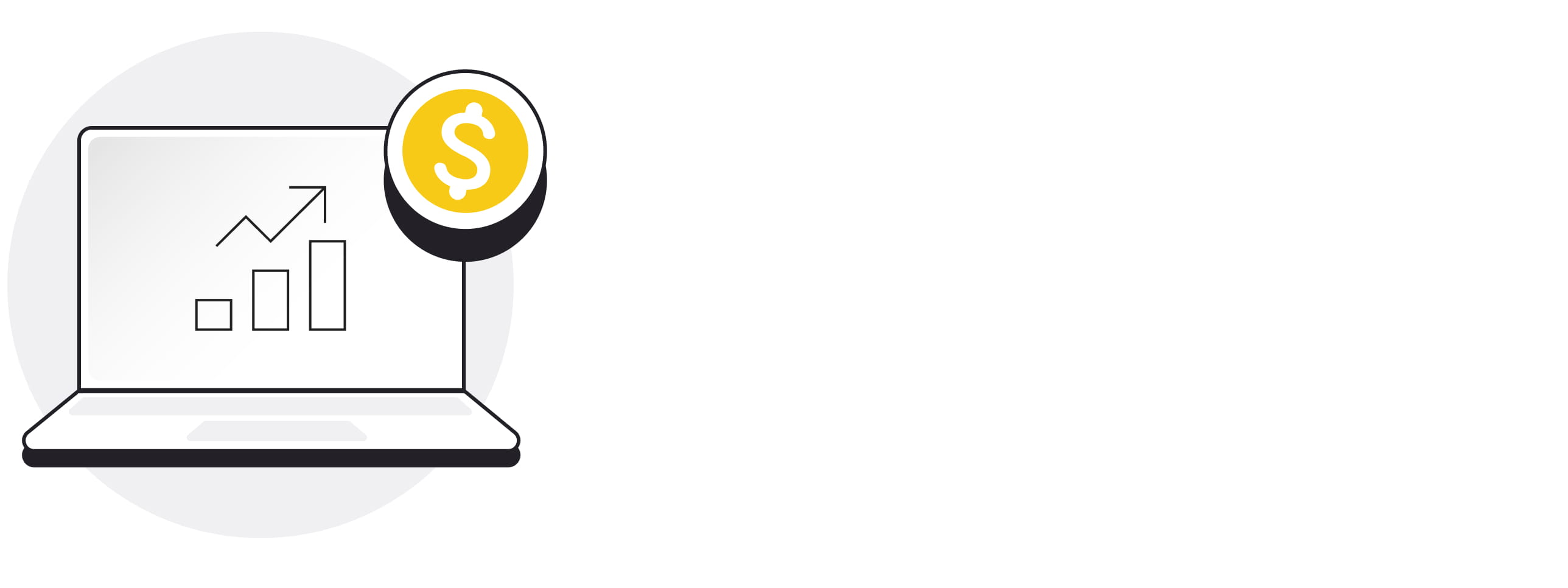
Examples of applications of data science and especially artificial intelligence are known worldwide, starting from simple financial predictions based on regression, through all kinds of applications of classification in factories, public services, online stores, or facilities of everyday life, to saving human lives by supporting doctors in their diagnoses and medical tests. One might think that data science has nothing to offer a company not focused on strictly AI projects. There is nothing further from the truth!
There is no limit to the number or type of enterprises that could potentially benefit from the opportunities presented by data science. Almost any business process can become more efficient through data-driven optimization And almost any type of customer experience can be improved through better targeting and personalization.
As an entrepreneur, no matter what type of business you run, you want to make the best decisions to allow it to grow. Careful collection of data about your business is the first step to success (yes, I know of companies that have literally thrown away valuable data). With data in hand, we can use data science tools to pull out key information and learn more about your business, identify your strengths and weaknesses, and identify essential business metrics to monitor in the future. Careful data analysis will also support the process of identifying and managing risks as well as making important business decisions.
Another important aspect for any business is customer relations - here too, data science can lend its helping hand. One way of applying DS is to analyze the sentiment of current and potential customers in social media or opinions posted on various forums about our company. Thanks to state-of-the-art NLP algorithms, it is possible to determine whether the people speaking about the company have a positive or negative attitude towards it. In combination with the observation of the timeline, we can assess whether the latest application release was positively received by users.
For businesses based on web services, service personalization and user profiling can be interesting topics. Thanks to the use of algorithms that catch certain user traits, we are able to provide them with an even better user experience and make them more eager to visit a given service. One slightly more advanced solution could be chatbots that increase user satisfaction by answering user questions in a much shorter time. The application of such a solution could also allow us to optimize consultants' work and redirect their time and abilities to other, more complicated tasks.
As I've shown in the few examples above, business development opportunities using data science are not just available to huge corporations or artificial intelligence companies, and properly designed solutions can do a lot of good - and that's just the tip of the data science opportunity iceberg.
The Differences in Using Data Science in a Corporation Versus a Startup
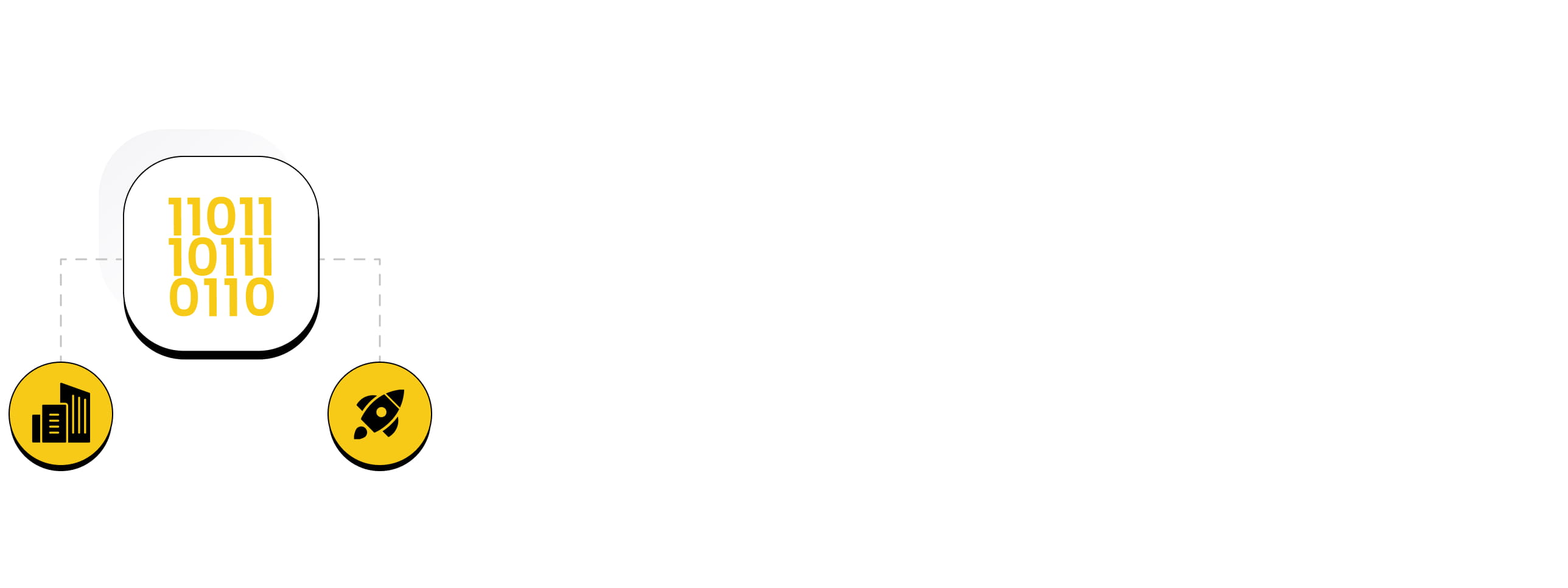
Many businesses believe that data science is meant only for big organizations having high-class infrastructure. Such a belief stems from a misconception about data science. Data science is not created by machines, heavy tools, or the size of work resources. Rather, it is big data, statistics, analytics, programming, presentation, and a few smart people who know how to make the best of data and add value to an organization. It has nothing to do with large or small organizations. There are some differences in the application of DS though.
Startups are all about building a product on time, so there's no room for extensive and time-consuming research and reinventing the wheel (which in corporations sometimes takes many months). Instead, it's better to use proven models or entire solutions, but in a strategic and well thought out way in terms of a given business problem.
One of the key differences between implementing DS in a startup project and a corporate project is the amount of risk taken. As VentureBeat reports, about 87 percent of machine learning models never make it to production. While large corporations can afford it and it's included in the cost, it can be a killer blow for a small startup, which is why a thoughtful plan of action, a solid idea, quality data and a good data scientist are so important.
Speaking of good data scientists, this concept can also vary between big companies and startups, and working there looks different from an employee perspective as well. I will share with you my observations from working as a data scientist in a corporation and in MasterBorn (which is pretty far from being a corporation).
Being a data scientist in a corporation, you will most likely work in a multi-member team where each person is only responsible for particular assigned tasks (which of course can be an advantage for some and a disadvantage for others). In such an environment, it is very likely that any change or innovation you propose will have to be discussed at countless meetings with successive managers, and by that time you will have forgotten what you wanted to change. Working in a small company or startup, you may be the only person responsible for the entire DS field or you will be a member of a very small team which results in much more room for maneuverability but also much more pressure and responsibility for the project.
Both situations have their pros and cons, There will certainly be fans of both solutions, so the most important thing is to know what to expect in each case to be able to make a conscious choice in accordance with our temperament, experience and career development plan.
Stay updated
Get informed about the most interesting MasterBorn news.
Data Science Startups
I would like to introduce you to 6 startups that have inspired me with their goals and the way they use data science. The companies featured have many noble objectives, some focusing on ecology, monitoring pollution, or reducing CO2 emissions, others helping to increase inclusivity and safety, and still, others working on physical and mental health. Additionally, they are very interesting from a data science point of view as they move in different DS areas: data analysis and representation, image processing, or data mining. The featured startups also work on many types of data such as numerical data, images, user surveys or satellite images. However, I think that the companies mentioned can inspire not only data scientists but also entrepreneurs from various fields.
1. Pachama
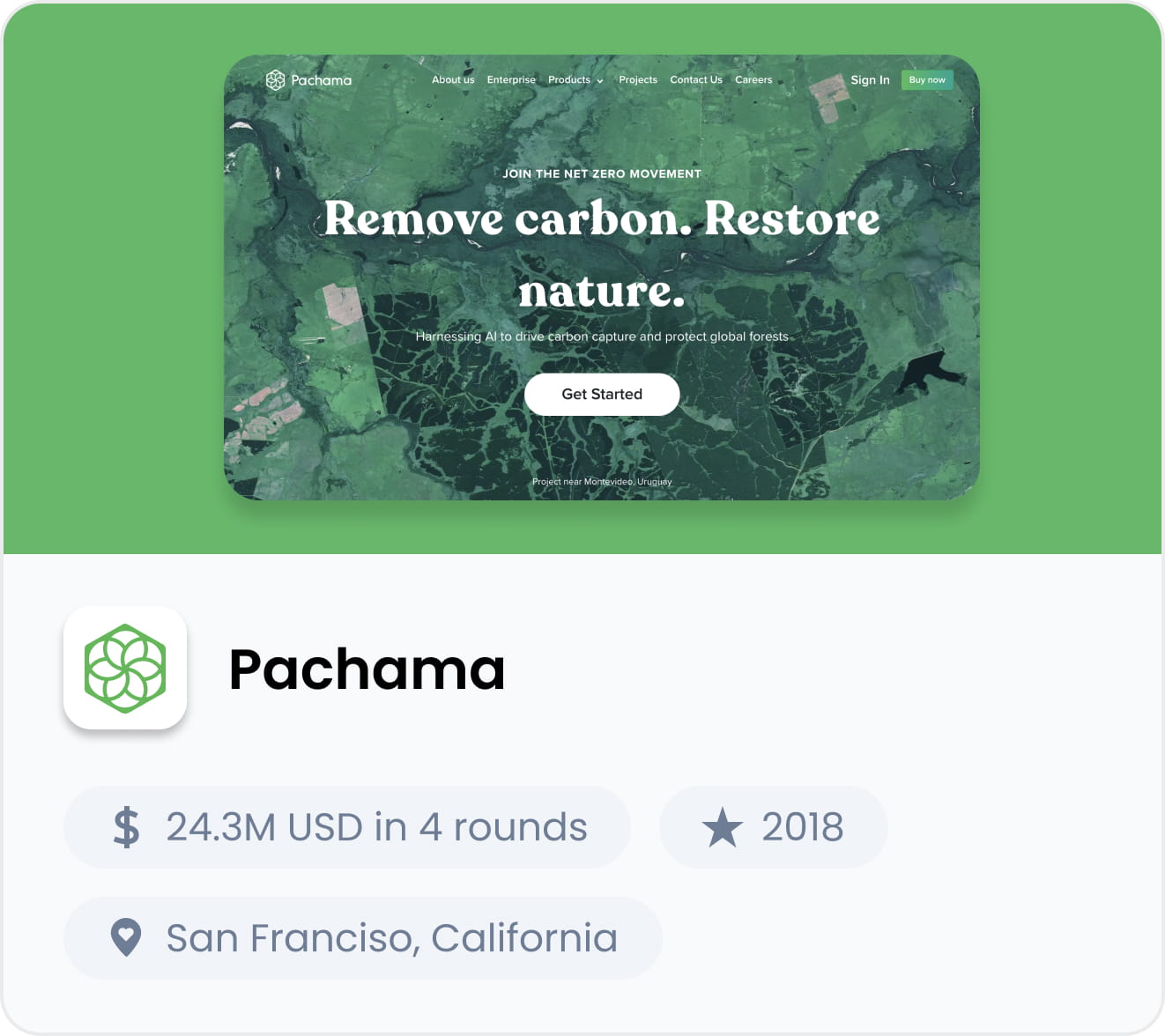
Founded: 2018
Location: San Francisco, California
Funding: $24.3M in 4 rounds
Pachama is a technology company whose mission is to bring nature back to life to address climate change. One of the key components of fighting climate change is to reduce the number of greenhouse gases in the atmosphere by protecting and replanting forests. Pachama automates the process of counting and observing trees, using lidar, satellite imagery and artificial intelligence to accurately measure changes in forest cover around the world. The platform monitors trees lost to illegal deforestation or wildfires, and as new trees grow, the artificial intelligence system estimates total biomass to understand the full carbon benefit at any given time. The company has also built a model to track annual trends over time, particularly in the Amazon rainforest.
2. Aclima
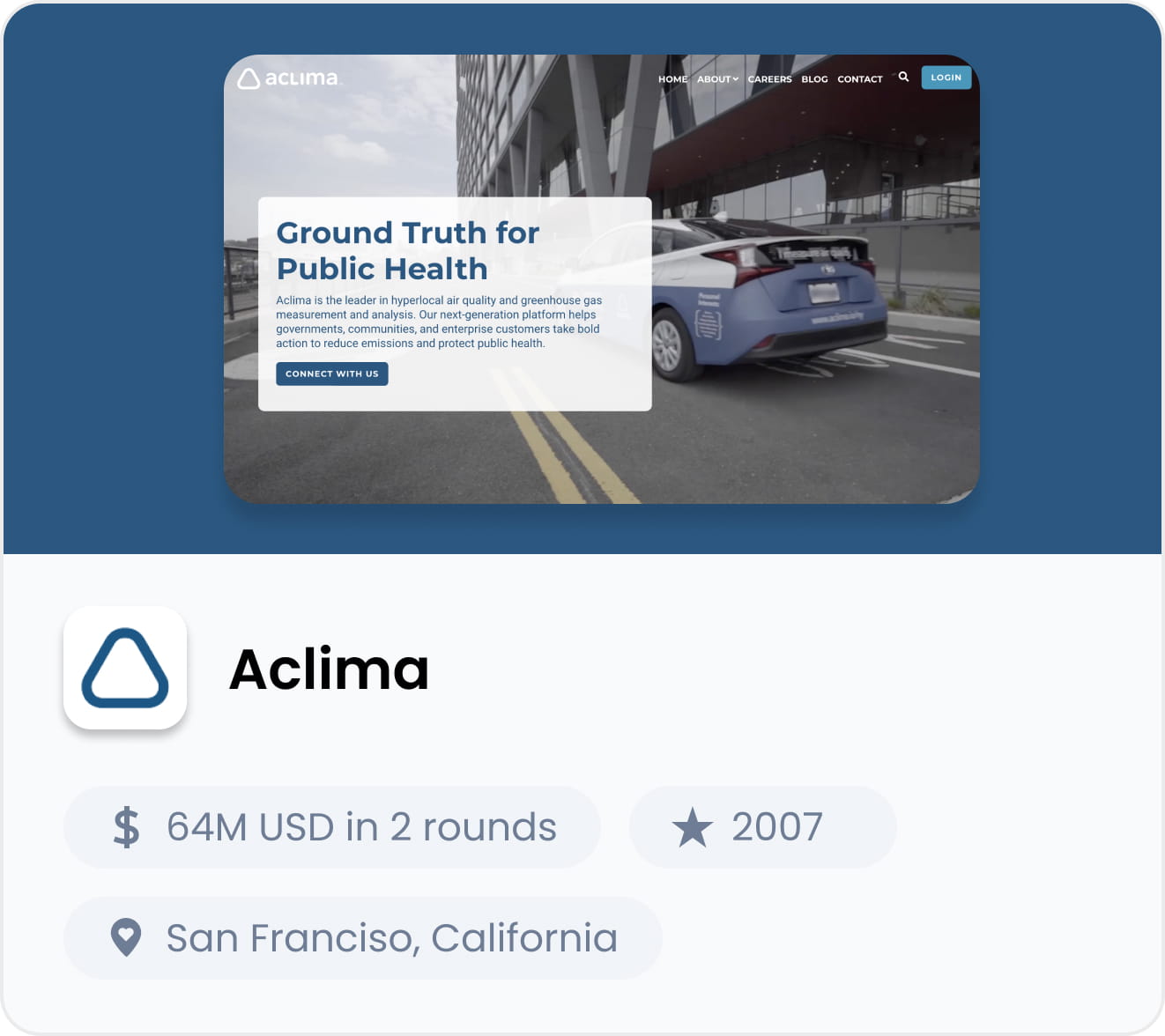
Founded: 2007
Location: San Francisco, California
Funding: $64M in 2 rounds
Have you ever wondered if the place you live in is more or less polluted than the surrounding neighborhood? Air pollution and greenhouse gas emissions can vary greatly even within a local area. The Aclima startup is pioneering a completely new way to measure and analyze air pollution and greenhouse gases, block by block and around the world. They have built a platform that enables hyper-local measurements. A designed network of sensors collects massive amounts of air quality data, which the Aclima platform then transforms into hyperlocal insights that help governments, advocacy groups and other stakeholders identify hot spots so they can take action to reduce emissions and protect public health. In 2019, the company began mapping and analyzing air quality in the 101 communities that make up the Bay Area, the first region-wide research project of its kind.
3. Userway
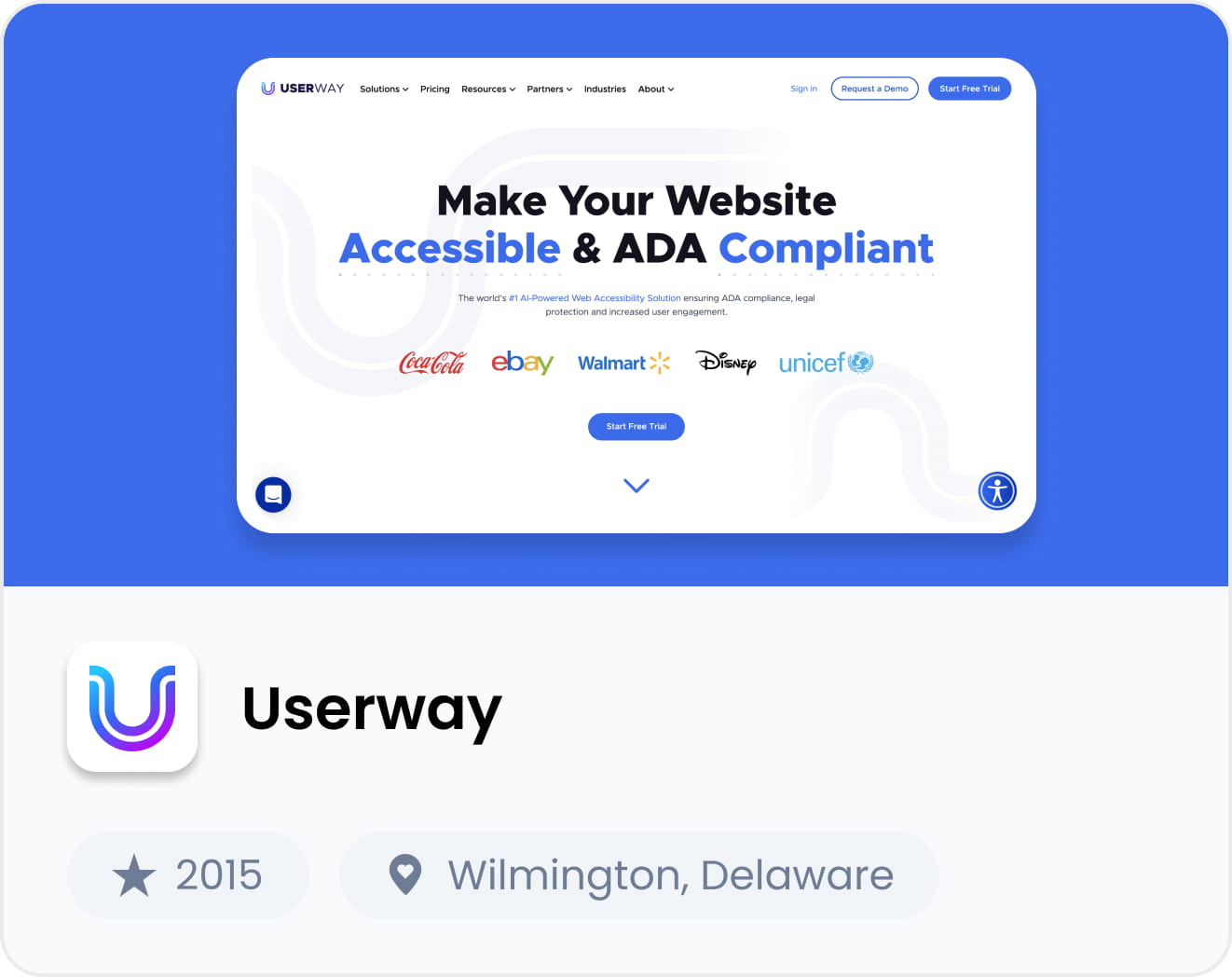
Founded: 2015
Location: Wilmington, Delaware
Funding: unknown
Despite the growing awareness of the challenges faced by people with disabilities, there are still many who are unaware of the accessibility shortcomings of their products. Accessibility is much more than being able to enlarge a font, it's a variety of principles collected in the ADA (The Americans with Disabilities Act) and WCAG (Web Content Accessibility Guidelines), among others. To ensure that website owners don't have to reinvent the wheel every time they want to make a site accessible, the American startup UserWay has come to the rescue. UserWay is a cloud-based ADA compliance management platform provider. It delivers an AI-powered website accessibility solution to ensure full ADA and WCAG compliance with an accessibility widget for multiple users with specific accessibility requirements. The platform also allows you to perform an in-depth analysis of your website, assessing its complexity and suggesting solutions and simplifications that will not only increase the accessibility of the product but also save companies from costly infringement lawsuits.
4. GeoSure
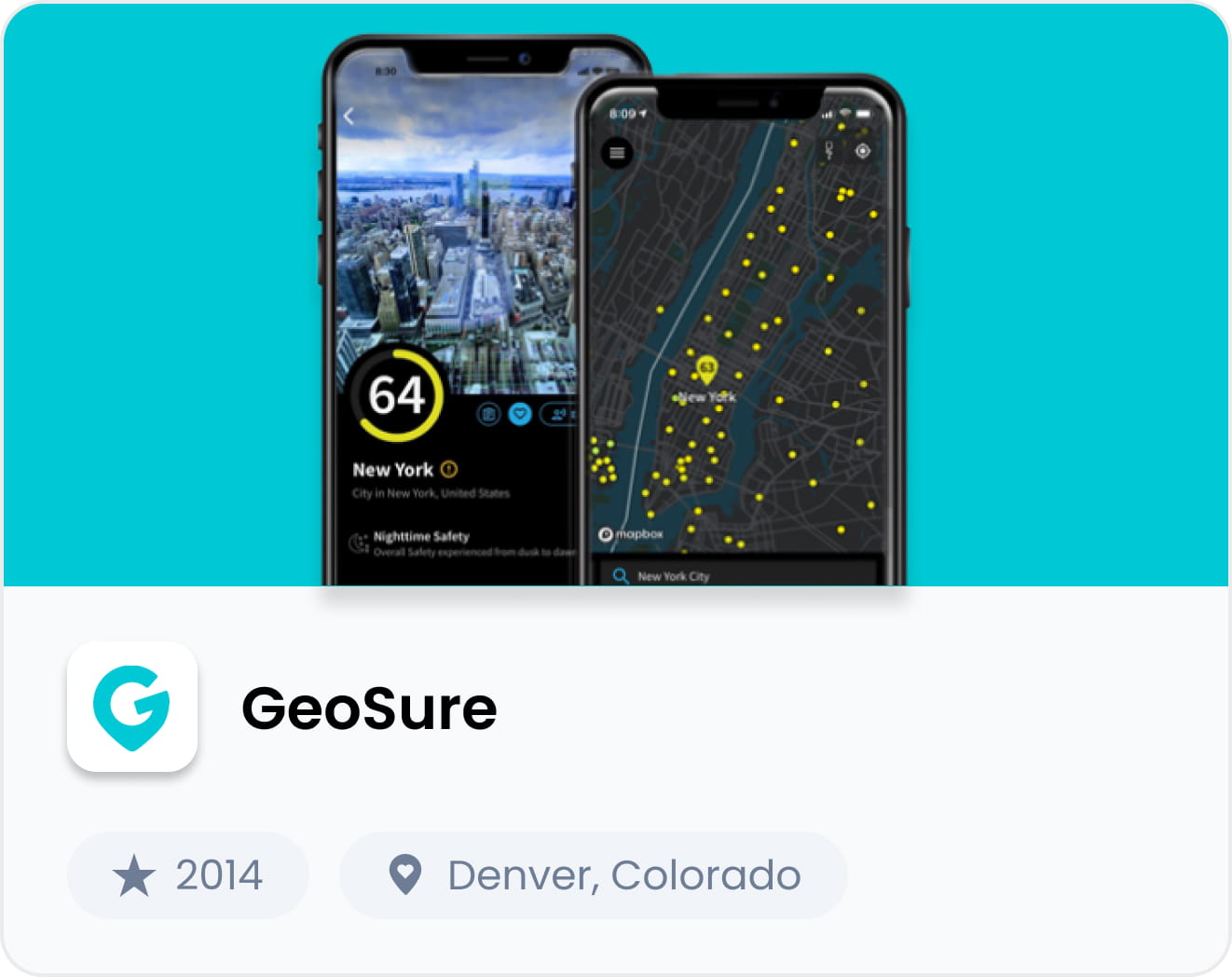
Founded: 2014
Location: Denver, Colorado
Funding: unknown
How do you measure safety? A company called GeoSure has set out to answer that question by creating a trusted, detailed, real-time security measurement platform. GeoSure's goal is "a safer, more predictable world." It was named one of the "World's Most Innovative Companies of 2021" by Fast Company. Using your cell phone or smartwatch, you can measure your personal security at any time, anywhere in the world, the company says. GeoSure provides safety rankings for more than 65,000 cities and neighborhoods around the world, taking into account factors such as basic freedoms, health and medical care, theft, women's safety and LGBTQ safety. The ratings are based on a range of data, some of which are collected from users via the company's smartphone app. This data is then verified using advanced statistical algorithms to produce the most detailed location security ratings in the world, across seven key security categories. Using advanced AI algorithms, the platform is able to not only assess the current state of security but also predict upcoming threats based on the observed data. For example, in January 2020, before most people understood the impact of the COVID-19 pandemic, GeoSure's algorithm accurately predicted the number of upcoming cases and identified cities like Seattle as danger zones.
5. Etta Epidermis
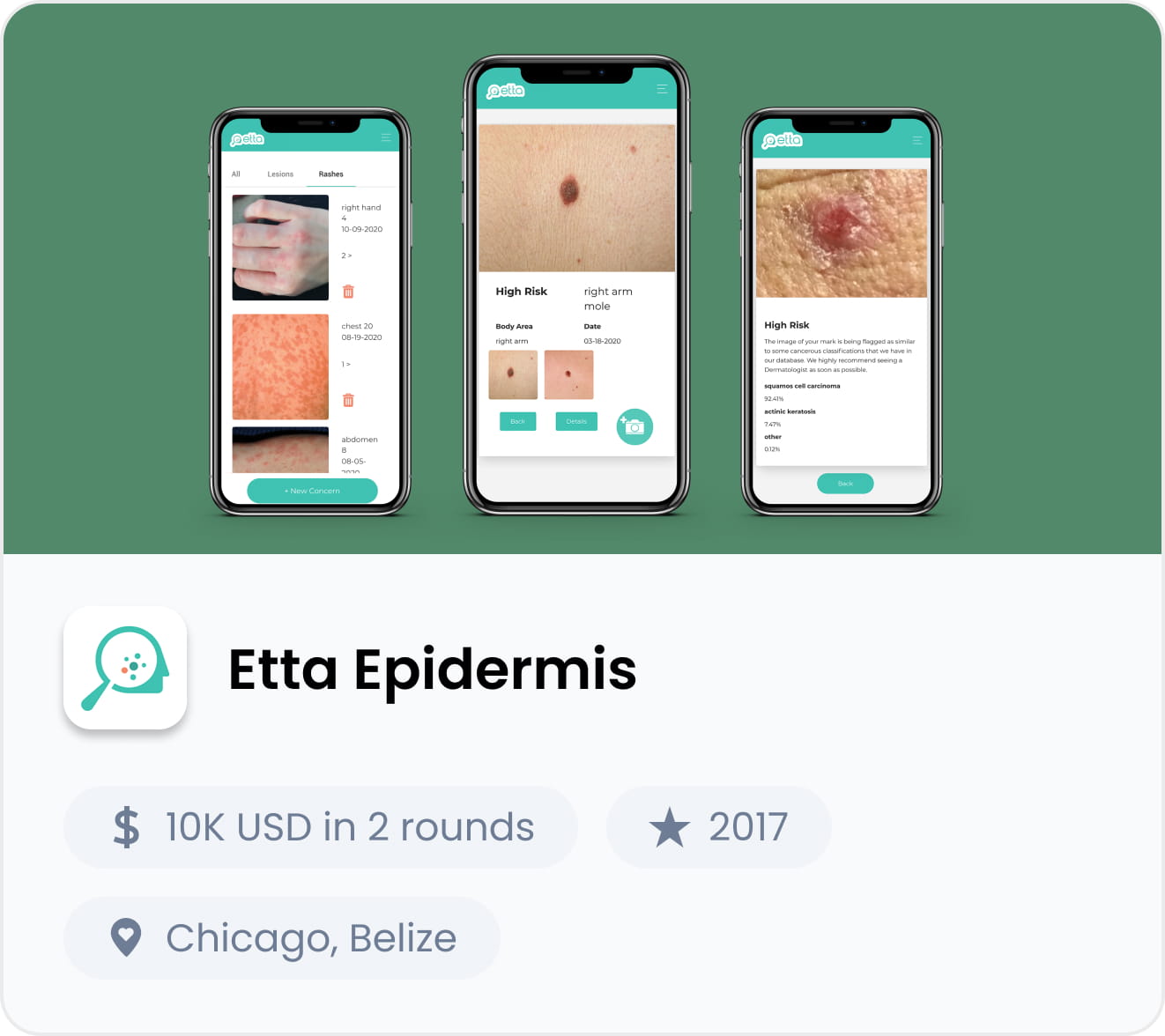
Founded: 2017
Location: Chicago, Belize
Funding: $10K in 2 rounds
If we had read the headline "This Colorado Startup is Using AI to Detect Skin Cancer" in the newspaper 20 years ago, we probably would have thought the journalists had gotten carried away. Today, such a statement is a fact, what's more, AI is able to detect some lesions even earlier than human doctors, which of course doesn't mean that they will stop being needed.
Skin cancer is the most common cancer in the US, but thanks to early detection, it is very treatable. The five-year survival rate for people whose melanoma is detected and treated before it spreads to the lymph nodes is 99 percent, according to the American Academy of Dermatology. Etta is a dermatology decision support tool that uses artificial intelligence to help specialists and non-specialists monitor the body for cancer, chronic skin diseases, and identify/build dermatology consultations for rashes and infections. Etta's web application allows you to instantly receive dermatological information based on image processing algorithms. With massive datasets from hospital-verified images, Etta quickly analyzes the image to provide detailed, data-driven skin insights. Although it's not a diagnosis, Etta can provide useful information and context in regards to your skin's health.
6. Ksana Health
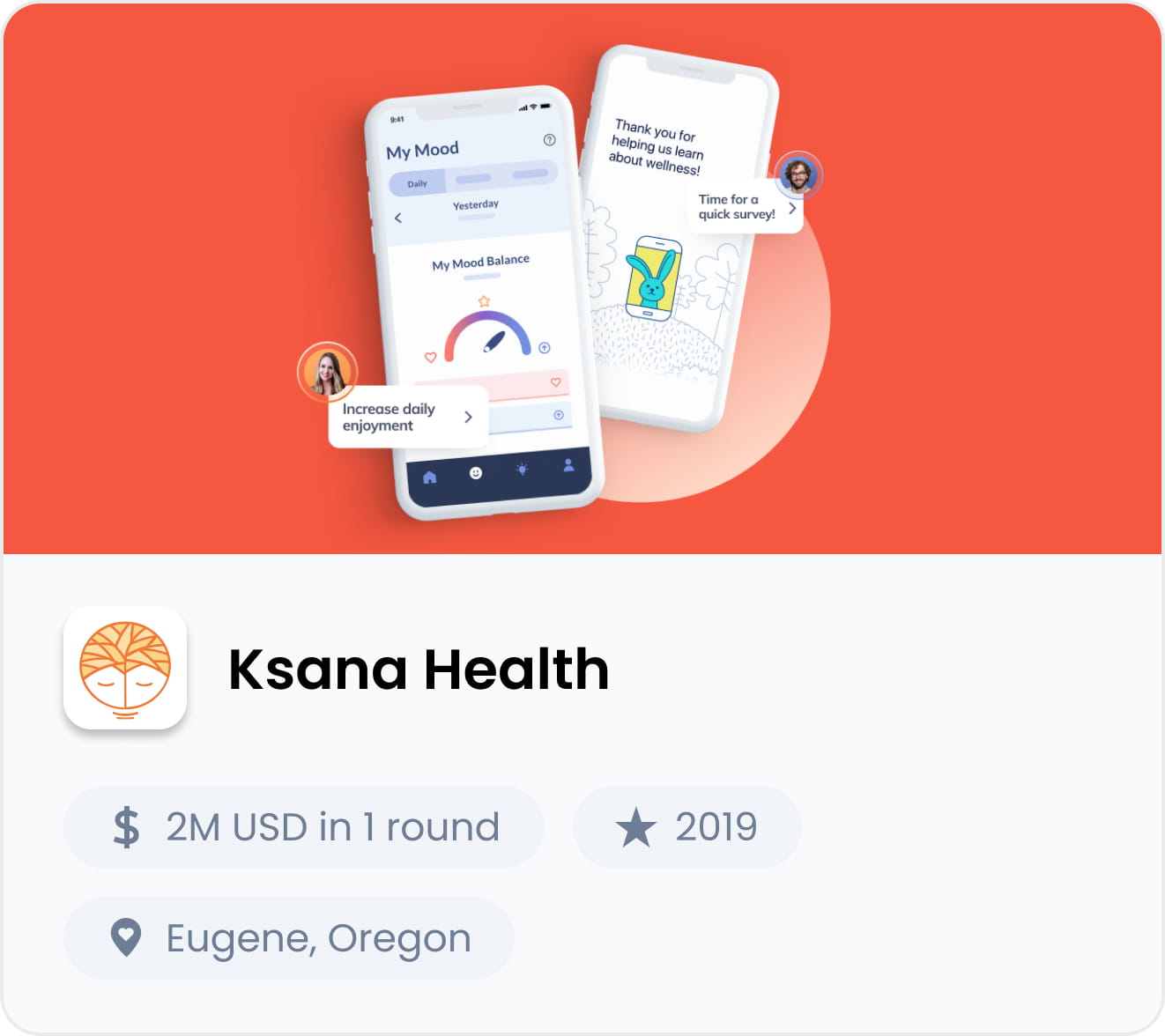
Founded: 2019
Location: Eugene, Oregon
Funding: $2M in 1 round
Innovation in mental health care is needed now more than ever, with already rising levels of anxiety and depression exacerbated by the COVID-19 pandemic. Ksana Health is a digital mental health company dedicated to revolutionizing behavioral health care and research through objective measurement and monitoring. Ksana Health aims to improve treatment outcomes by moving the treatment plan from the office to the patient's daily life through a personalized phone app platform and physician dashboards. Experts have noted that one of the biggest problems with mental health services is that they are stuck in the office or limited to weekly Zoom calls when better outcomes can be developed during ongoing, seamless care and follow-up of one's health. Ksana Health addresses this problem with continuous remote patient monitoring, objective data, digital therapies and seamless navigation across multiple levels of care, supporting people as and when they need it. The uploaded data is validated and then used by a team of data analytics experts, who provide customized research services to extract and deliver selected features to a given study group, helping to turn data into knowledge.
Psst! We are more than happy to be a business partner for Ksana Health, as at MasterBorn we place a very high priority on a healthy work atmosphere and the well-being of both the team and our clients.
Summary
Without a doubt, data science will be a rising star in the coming decades, and it's up to us to take advantage of the opportunities it brings. The vast amounts of data that is created every day can be used to not only sell us more and more products but also to bring something fresh.
We should remember that data science is not reserved for only large corporations, and with a good idea, it can take even a fledgling startup to great heights. I would say that the number of potential applications of data science is limited only by the human imagination, and it is worth considering whether there is something in our business that data science could help us with.
Table of Content
World-class React & Node.js experts
Related articles:
7 Disruptive U.S.-Based Cloud Native Startups to Have on Your Radar
If you’re a SaaS startup, betting on the cloud is a natural choice - you need your application to be available everywhere and to everyone.
7 Side Projects That Grew into Million-Dollar Companies
Let's get inspired! Here are 7 side projects that started small but later became large and successful companies.
Grocery prices have risen 25% since 2019. This tech company could help cut them.
3 of the Top 50 Grocers are using Portager's platform.